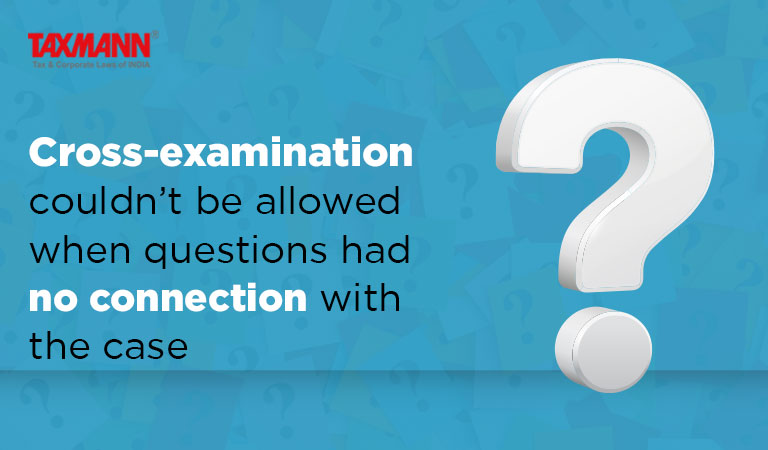Cross-examination couldn’t be allowed when questions had no connection with the case
- Blog|News|FEMA & Banking|
- 2 Min Read
- By Taxmann
- |
- Last Updated on 4 November, 2022

Case Details: Kanwal Nain Singh Mokha v. Rekha Khurana - [2022] 143 taxmann.com 275 (HC-Delhi)
Judiciary and Counsel Details
-
- Ms Asha Menon, J.
- Praveen Suri, Adv. for the Petitioner.
- Gurpreet Singh, Adv. for the Respondent.
Facts of the Case
In the instant case, the question was placed before the High Court as to whether cross-examination of witnesses could be allowed when questions were irrelevant and had no connection with the case.
The petitioner’s case was that he had given a certain friendly loan to the accused. In order to discharge the said loan, the accused issued a cheque which got dishonoured. Thereafter, the petitioner filed a complaint u/s 138 of the Negotiable Instruments Act, 1881 against the respondent.
The petitioner sought an opportunity to ask questions and to further cross-examine the son of the accused, who was examined as a defence witness. In this regard, the questions put during the cross-examination were as follows –
(a) Whether the accused/witness/or his wife had taken a friendly loan from any other person? and
(b) Whether another case against the wife of the witness was pending before the Trial Court?
The Trial Court disallowed the said questions. Thereafter, an appeal was preferred to the High Court against the order passed by the Trial Court.
High Court Held
The High Court observed that said questions were absolutely irrelevant and had no connection with the instant case as an answer, either way, would not help in arriving at a decision in the instant case. Further, the High Court observed that Trial Court ought to have considered the relevancy of the question in terms of Section 5 of the Indian Evidence Act, 1872.
The High Court held that where the Court came to a conclusion that a question, particularly, in cross-examination is irrelevant or prompted by such motives such as harassment or annoyance to the witness or delaying the conclusion of cross-examination of the witnesses by embarking on a rambling course, Trial Court was well empowered to put to an end to such questioning.
Further, the High Court held that during examination-in-chief or cross-examination, only such questions must be allowed which are relevant to the matter at hand and to rival stands, elucidating or disproving the rival cases.
In view of the above, it was held that cross-examination of witnesses couldn’t be allowed when questions were irrelevant and had no connection with the case. Accordingly, the appeal was to be dismissed.
List of Cases Reviewed
-
- Complaint Case No. 19224/2016, dated 7-5-2022 (para 19) affirmed.
List of Cases Referred to
-
- R.K. Chandolia v. CBI 2012 SCC Online Delhi 2047 (para 8)
- Pepsi Foods Ltd. v. Special Judicial Magistrate [1998] 5 SCC 749 (para 9).
Disclaimer: The content/information published on the website is only for general information of the user and shall not be construed as legal advice. While the Taxmann has exercised reasonable efforts to ensure the veracity of information/content published, Taxmann shall be under no liability in any manner whatsoever for incorrect information, if any.

Taxmann Publications has a dedicated in-house Research & Editorial Team. This team consists of a team of Chartered Accountants, Company Secretaries, and Lawyers. This team works under the guidance and supervision of editor-in-chief Mr Rakesh Bhargava.
The Research and Editorial Team is responsible for developing reliable and accurate content for the readers. The team follows the six-sigma approach to achieve the benchmark of zero error in its publications and research platforms. The team ensures that the following publication guidelines are thoroughly followed while developing the content:
- The statutory material is obtained only from the authorized and reliable sources
- All the latest developments in the judicial and legislative fields are covered
- Prepare the analytical write-ups on current, controversial, and important issues to help the readers to understand the concept and its implications
- Every content published by Taxmann is complete, accurate and lucid
- All evidence-based statements are supported with proper reference to Section, Circular No., Notification No. or citations
- The golden rules of grammar, style and consistency are thoroughly followed
- Font and size that’s easy to read and remain consistent across all imprint and digital publications are applied



 CA | CS | CMA
CA | CS | CMA
